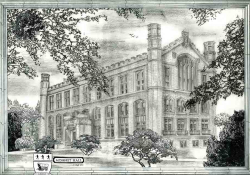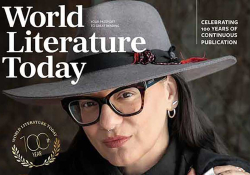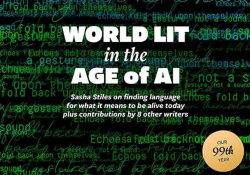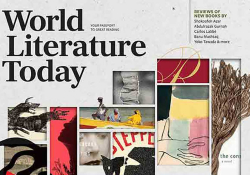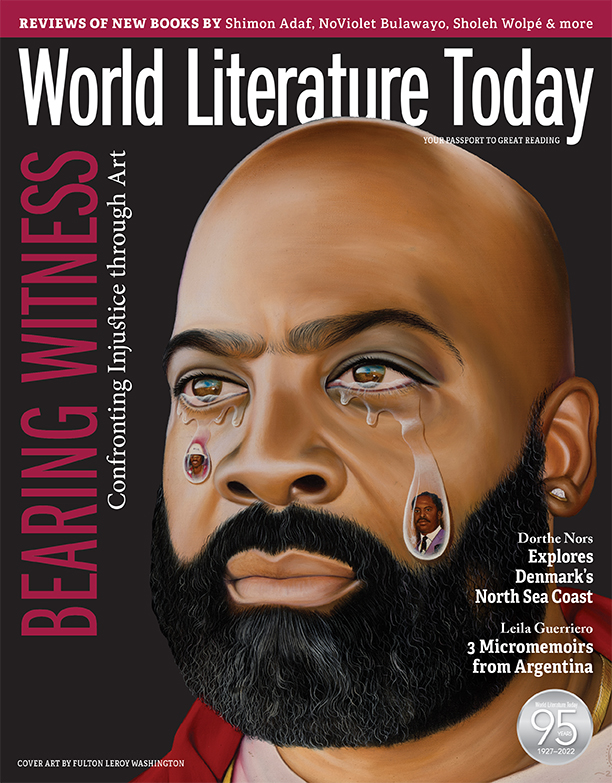Editor’s Note
For the dead and the living, we must bear witness.
For not only are we responsible for the memories of the dead,
we are also responsible for what we are doing with those memories.
– Elie Wiesel
 IN THE FOLLOWING passage by Chilean poet Carlos Soto-Román in this issue’s “Bearing Witness” cover feature, the reader might not be sure who is speaking: “At first, when you start, you cry and try to hide it, so nobody notices. Then, you feel bad, a lump forms in your throat but you can hold back the tears. And then, . . . you get used to it. And in the end, you don’t even feel what you’re doing anymore” (page 53). In the context of the docu-poem, however, it’s entirely clear: we are reading the confession of one of Augusto Pinochet’s executioners. These lines immediately follow a 1977 speech that the US-backed dictator gives to torch-bearing supporters in Chacarillas, during which Pinochet wraps himself in the mantle of “Homeland, flag, and youth” even while ordering the execution of suspected political enemies. Lest we gloss over the connection, the poem clinically catalogs the cause of each extrajudicial death: “Cervical thoracic trauma. Cardiopulmonary arrest. Head injury by firearm. Destruction of the thorax and cardiac region. Execution.” Is it possible to feel empathy for soldiers who merely carry out the orders of their commanding officers? It’s possible, until we learn they subject their victims to torture that involves every manner of physical torment—including electric shock, rape, and mock executions—and continues up to the actual moment of execution: the firing squad first aims for “the legs, then the sexual organs, then the heart.”
IN THE FOLLOWING passage by Chilean poet Carlos Soto-Román in this issue’s “Bearing Witness” cover feature, the reader might not be sure who is speaking: “At first, when you start, you cry and try to hide it, so nobody notices. Then, you feel bad, a lump forms in your throat but you can hold back the tears. And then, . . . you get used to it. And in the end, you don’t even feel what you’re doing anymore” (page 53). In the context of the docu-poem, however, it’s entirely clear: we are reading the confession of one of Augusto Pinochet’s executioners. These lines immediately follow a 1977 speech that the US-backed dictator gives to torch-bearing supporters in Chacarillas, during which Pinochet wraps himself in the mantle of “Homeland, flag, and youth” even while ordering the execution of suspected political enemies. Lest we gloss over the connection, the poem clinically catalogs the cause of each extrajudicial death: “Cervical thoracic trauma. Cardiopulmonary arrest. Head injury by firearm. Destruction of the thorax and cardiac region. Execution.” Is it possible to feel empathy for soldiers who merely carry out the orders of their commanding officers? It’s possible, until we learn they subject their victims to torture that involves every manner of physical torment—including electric shock, rape, and mock executions—and continues up to the actual moment of execution: the firing squad first aims for “the legs, then the sexual organs, then the heart.”
In her landmark anthology Against Forgetting: Twentieth-Century Poetry of Witness (1993), Carolyn Forché claims a social and ethical space for poetry marked by “the impress of extremity,” in between the poles of exclusively “personal” or “political” poems. Forché surveys the twentieth century as a “temporal debris field where historical remains are strewn” and describes her strategy of adopting an “evidentiary” reading of works in which language itself has passed through the suffering endured, and the trace of that suffering is legible. In addition to Soto-Román, all of the poets in this issue’s cover feature—Cengiz Sinan Çelik, Lidija Dimkovska, Jaime Huenún Villa, and Grzegorz Kwiatkowski—foreground the impress of such extremity in their work. For Dimkovska and Kwiatkowski, the Auschwitz and Stutthof concentration camps mark the furthest extreme of genocidal “legibility.” Huenún, who is also from Chile, honors two murdered Indigenous activists. In a 2017 interview published in WLT, Forché notes that, ultimately, “Witness is neither martyrdom nor the saying of a juridical truth, but the owning of one’s infinite responsibility for the other.”
Against such stark realities, the poets insist on human dignity, solidarity, even innocence. Kurdish poet and painter Çelik—who was arrested in 1997, signed a confession under torture, and sentenced to life in prison by the Turkish government—imagines “children, the birds of sky / sinless” who “depict life with the tongue / of weeping willows.” That empathy for the powerless also marks the contributions by artist Fulton Leroy Washington, writer Yvonne Adhiambo Owuor, and photographer Laura Larson. In her remarkable essay, Owuor writes: “One of my sovereign choices in this wrestling ground of being is to endeavor to consistently shine a light deep into the abyss, using an arsenal of words that cut to the marrow, to affirm the highest ideals embedded in the human spirit, to deny power to that which violently intends to consume, deny, desecrate, divide, and mock our existence. It requires not so much an act of will as much as an act of unrequited love for humanity and life, even in its failings, faults, suffering, offenses, and woundedness.”
Infinite responsibility. Unrequited love. These writers/artists challenge readers/viewers to act with what Larson calls “radical empathy.” In the domain of bearing witness, such empathy demands that we confront injustice and undertake ethical action.
Daniel Simon
